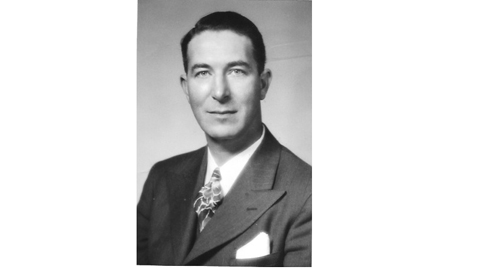Estes Kefauver had started out his political life allied to the ruling faction in Tennessee politics; that of senior Senator Kenneth D. McKellar and E. H. Crump, leader of the Shelby County political machine. With his election to Congress in 1939, Kefauver began to drift away from his political moorings. When the young Congressman fought the amendments Senator McKellar passed in the Senate affecting the Tennessee Valley Authority, Kefauver became solidly identified as an opponent of McKellar and Crump. Senator McKellar especially came to dislike Estes Kefauver intensely. McKellar’s loathing of Kefauver would draw the two men into political conflict and the ambitious Kefauver would toy with the idea of challenging the old senator for reelection in 1946.
Kefauver did not waste time in separating himself from his Southern colleagues in the House. While the House was debating a bill to eliminate the poll tax, Southern Congressmen were surprised to find Estes Kefauver wandering from the herd. Kefauver was subjected to a bitter tirade by Mississippi Congressman John E. Rankin, who strongly objected to federal interference in the affairs of individual states. Rankin was also a gleeful racist and race-baiter. Congressman Rankin pointed a bony finger at Kefauver and cried, “Shame on you, Estes Kefauver!”
Congressman Kefauver readily admitted his desire to end the poll tax was not “politically expedient” in his home state of Tennessee, but retorted he would do what he thought was right. It is also true opposition to the poll tax had been embraced by just about every opponent to the Crump machine in Memphis. Generally those candidates favored by Senator McKellar and Mr. Crump had supported retention of the poll tax, while opponents to the McKellar – Crump alliance supported repealing the poll tax.
Describing the poll tax as “repugnant to democracy”, Kefauver went well beyond opposing the poll tax being applied to the ballots of soldiers fighting in the World War, saying it “should not be tolerated” at all.
Kefauver’s fellow Southerners quickly came to view the Chattanoogan with suspicion. That suspicion would later become outright dislike.
As a Congressman, Kefauver generally was supported by labor groups, although he deviated from the official position taken by big labor occasionally. One such occasion was Kefauver’s support for the Smith-Connally bill. Kefauver’s return to Chattanooga following his vote in favor of the Smith-Connally legislation caused the Congressman to be castigated by labor supporters. Unlike many Democrats in the Tennessee Congressional delegation, Kefauver was opposed to the Taft-Hartley bill, although Kefauver retained considerable personal respect for the sponsor, Senator Robert A. Taft of Ohio.
Kefauver surprised some labor leaders with his attitude on legislation; Kefauver did not hesitate to say he disagreed with a particular stand taken by his labor supporters, but added he would change his stand if someone could show him where he was wrong. It was an attitude that both surprised and pleased labor leaders. Many Southern Congressmen and senators were quite hostile to big labor at the time. It was yet another aspect of Estes Kefauver’s political philosophy that put him at odds with other Southern legislators. The dislike of Kefauver by some Southerners became quite pronounced and it began to affect Kefauver’s ability to pass legislation.
According to Kefauver’s biographer, Charles Fontenay, Congressman Kefauver had introduced a bill to give a woman $10,000 whose son had been killed while working for the Civilian Conservation Corp. Senator James Eastland of Mississippi three times kept Kefauver’s relief bill from passing, although it had been approved by the House of Representatives.
Republican Congressman John Jennings, Jr. finally walked across the Capitol to visit Eastland personally and was bluntly told the bill would never be passed because it was Kefauver’s bill.
Judge Jennings replied that it was not Kefauver’s bill, but his own.
“Oh, in that case we’ll pass it,” Senator Eastland quickly said.
The suddenly amiable Eastland even agreed to increase the poor woman’s compensation bill by $3,500 after it had been reduced to $2,500 by the Senate.
Congressman Kefauver later helped Jennings, a Knoxville Republican, when President Truman intended to veto a claims bill Jennings had sponsored. Kefauver managed to convince Truman not to exercise his veto power. Truman would later become a bitter enemy of Estes Kefauver and likely disliked the Tennessean as much as did Senator McKellar.
Harry Truman was himself the product of a political machine, that of Boss Tom Pendergast of Kansas City. A man of intense personal and political loyalties, Harry Truman disliked Kefauver’s independent political spirit. Kefauver found himself embarrassed as the president’s disdain for him manifested itself in small ways. Congressman Kefauver had tried to arrange for a class of Baylor School students to have their picture taken with President Truman and was advised by the White House the request was impossible.
Kefauver was therefore shocked to see a group of smiling Baylor youngsters smiling with Truman on the front page of the Chattanooga News Free Press. It was doubly humiliating for Kefauver as the News Free Press was a newspaper solidly opposed to him.
The appointment with the President was supposedly made by Tennessee’s junior United States senator, Tom Stewart, but it was the powerful Senator McKellar who had interceded on behalf of the Baylor students.
Kefauver angrily wrote the President’s appointments secretary, Matthew Connally, to complain. Kefauver said it was a “shoddy way to do anyone” and went onto gripe “to say that I am embarrassed is putting it mildly.”
The Congressman dropped a hint that he might be less inclined to support Truman’s legislative program, especially as it seemed those who were less helpful to Truman were able to wrangle favors from the White House.
Kefauver would later tussle with McKellar over patronage in Tennessee and rarely ever did he get his way. The venerable McKellar had been in Congress since Kefauver was about eight years old and was accustomed to fighting for control of political patronage in his home state. More than one McKellar colleague was left to complain Old Mack had control of virtually all political appointments in Tennessee.
Whatever Kefauver’s disappointments in Washington might have been, he remained highly popular inside his Congressional district. Kefauver was almost as good as Senator McKellar in writing folks and doing whatever he could to be helpful. He returned to Chattanooga often and never missed an opportunity to move around his district and visit with voters.
Kefauver was also pleased by finally having a child. Nancy and Estes Kefauver had almost given up on having a family of their own and were considering adopting a baby when Mrs. Kefauver joyfully announced she was pregnant. Their daughter Eleanor was born, but the child proved to be exceptionally strong minded and later renamed herself “Linda.”
Absolutely refusing to answer to her given name, Estes and Nancy Kefauver, along with everyone else, finally capitulated and referred to their daughter by the name she had chosen for herself.
The Kefauver household was growing with the arrival of their daughter and including a cook and two cocker spaniels. Kefauver’s apartment was seeming ever smaller and he was forced to rent an adjoining apartment to give the family more living space.
The Kefauver family continued to expand when Estes and Nancy adopted a little boy from an adoption agency in Illinois. The blond, blue-eyed little boy was six weeks old when he went to live with his new family and it was not long after that Nancy discovered she was pregnant again.
To pare down expenses, Kefauver gave up the rented home he kept in Chattanooga and when the Kefauvers went home to Tennessee, they moved in with friends for the duration.
Congressman Kefauver was reelected easily every two years, but the politics inside his Hamilton county base continued to evolve. The political feud between Judge Will Cummings and Wilkes Thrasher continued to rage, but a new force to be reckoned with appeared in the form of Wiley Crouch. Couch beat Cummings to serve as County Judge, while Cummings still held considerable sway with the County Commission. For sometime, all the feuding factions supported Kefauver for Congress.
Most all of the feuding factions also strongly supported Senator K. D. McKellar; in fact, most were firstly loyal to the aging senator. As 1946 approached, the ambitious Kefauver began to consider moving up to the United States Senate. Kefauver liked McKellar no better personally than McKellar liked him. McKellar would be seventy-seven years old when he had to seek reelection in 1946, although there were few signs the senator was truly vulnerable to a serious challenge inside the Democratic primary.
McKellar’s health was beginning to deteriorate and every fall, fainting spell and bad cold received attention in the Tennessee newspapers. McKellar had also not had real opposition inside the primary since 1928. Despite having done personal favors for tens of thousands of Tennesseans, McKellar’s battles with TVA Director David Lilienthal had sapped some of his personal popularity back home.
Yet there was little reason to believe the McKellar – Crump alliance had lost any of its potency at the polls. Jim Nance McCord, the gubernatorial candidate supported by McKellar and Crump in 1944, had run without opposition inside the Democratic primary and would be running for reelection in 1946.
Despite being seventy-seven years old and having served in Congress since 1911 and the United States Senate since 1917, there was no sign the aging senator intended to retire. In fact, quite to the contrary. There was every reason to believe the old senator intended to run for a sixth term in 1946.
Estes Kefauver began sounding out friends and supporters for a potential Senate bid in 1946 against Tennessee’s most formidable vote-getter and perhaps the most personally popular political figure in the state.







